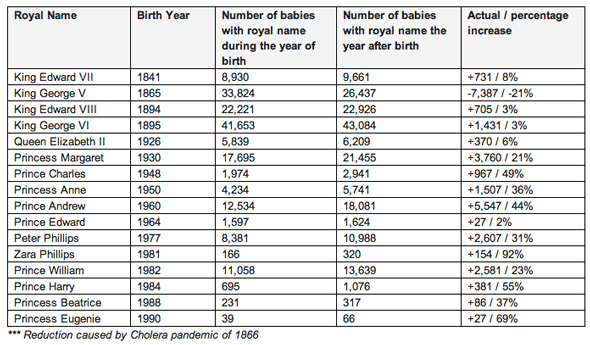The following is from Ancestry.com:
- The popularity of a royal baby’s first name increases by an average of 32 percent the year after the baby is born
- Historically, Prince Andrew (born in 1960) has had the biggest impact on baby names
Provo, UT (24 July, 2013) – Ancestry.com, the world’s largest online family history resource, predicted today that George will be the fourth most popular baby name in the United Kingdom in 2014, with 1,400 more Georges to be born then in 2013. The birth of a royal baby typically increases the popularity of that name by almost a third (32 percent) the year following the birth. This equates to an average of 1,400 babies born in the UK in the year following a royal birth that are given the same royal name.[i]
With 4,340 George’s born each year in the UK, this trend predicts a total of 5,740 being born in 2014 – pushing it from 12th position to the fourth most popular baby name for a boy.
The royal naming pattern was uncovered through historical analysis of yearly birth indexes available on Ancestry.com, which detail every baby born in England and Wales from 1837 to 2005. The number of babies with the same name as a royal baby in the year of the royal’s birth was compared with the number in the following year. Every royal from King Edward VII (born in 1841) to Princess Eugenie (born in 1990) was included in the study.
“The royals are always trendsetters for the population, and Prince William and Princess Kate have been no exception,” said Michelle Ercanbrack, a Family Historian at Ancestry.com. “If history is any indication, we fully expect George to jump in popularity amongst UK baby names.”
The research from Ancestry.com uncovered these specific impacts of previous royal births:
Prince Andrew’s birth was found to have the biggest impact on expecting parents, with the number of ‘Andrews’ born in 1961 increasing by more than 5,500 compared to the year of his birth (1960).
In terms of percentages, the birth of Zara Phillips saw the biggest rise in popularity. The number of ‘Zaras’ increased by 92 percent the year after her birth.
Other royals who had a significant impact on baby names include Princess Anne (increasing the popularity of ‘Anne’ by 36 percent and 1,507 total babies), Princess Margaret (21 percent, 3,760 babies), Peter Phillips (31 percent, 2,607 babies), Prince William (23 percent, 2,581 babies) and King George VI (3 percent, 1,431 babies).
Prince Harry, Princess Beatrice and Princess Eugenie- the youngest of the royals- had only a small impact on the actual number of babies given their names. To the contrary, by percentage their births expanded the popularity of their names by 55 percent, 37 percent and 69 percent respectively.
On average, the male royal babies were found to have a bigger impact in volume (resulting in an average of 1,664 instances of the name the following year, as opposed to 1,010 for girls), yet female royal babies had the largest impact by percentage, increasing the popularity of their names by 43 percent, compared to 24 percent for boys. An explanation for this difference could be that female royals have typically had more unusual names such as Eugenie or Zara that were not previously popular.
In fact, the only royal born in the past 170 years whose name actually decreased in popularity after his birth was King George V, with the number of ‘Georges’ born in 1866 falling by more than 7,000 compared to the year before. A likely explanation for this disruption in the naming trend could be the impact of London’s cholera pandemic[ii] on the population, as many people perished during this period.
Derived from the Greek name Georgious, which means farmer, George has been a British staple name for centuries and is the third most common name for English monarchs (6 times) since 1066 after Henry (8 times) and Edward (8 times).
Table 1- The impact a royal birth has on the popularity of that name:
About Ancestry.com
Ancestry.com is the world’s largest online family history resource with approximately 2.7 million paying subscribers across all its websites. More than 11 billion records have been added to the Ancestry.com sites and users have created more than 50 million family trees containing more than 5 billion profiles. In addition to its flagship site www.ancestry.com, the company operates several Ancestry international websites along with a suite of online family history brands including Archives.com, Fold3.com and Newspapers.com, all designed to empower people to discover, preserve and share their family history.
